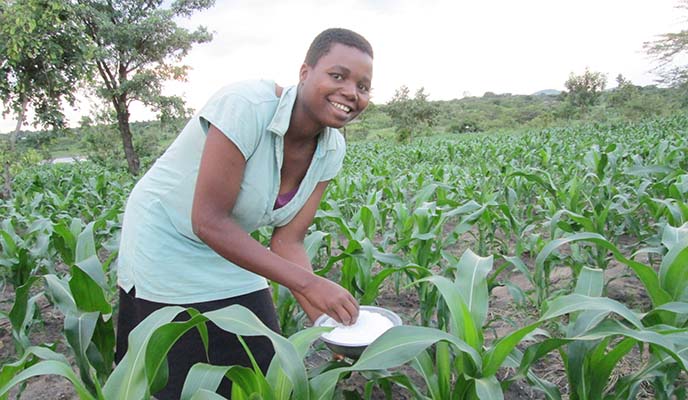
The majority of smallholder farmers in developing countries treasure their relationship with the natural environment. When top down scientific “truths” offer unsatisfactory answers, the farmers resort to what they know best.
In a recent conversation with eMKambo, many farmers expressed a strong view that a teacher-pupil relationship between extension officers and farmers has outlived its usefulness. Sadly, even in cases where the farmer has more practical knowledge than the extension officer, very few extension officers are willing to learn from the “pupil” (farmer). With the way markets and ICTs are exposing farmers to many best practices than before, agricultural extension is no longer about putting ideas into the heads of farmers, but enabling them to show what they know and use that knowledge in identifying and solving problems. Some farmers told eMKambo that they learn more from doing the opposite of what extension officers recommend.
Notions around soil
For some farmers, fertiliser recommendations from extension services, fertiliser companies and agriculture-related NGOs suggest that sandy soils are inferior to red or black clay soils. As if to confirm this notion, during Zimbabwe’s land reform, some farmers who were allocated land on sandy soils were given more hectares than those on black and red soils. Yet, according to the farmers, depending on crop, sandy soils can actually be superior to red soils. While soya bean production is being promoted in many areas, farmers say trying to produce the crop in sandy soils is a waste of resources because yields will certainly be much lower than in black and red clay soils.

There has been information to the effect that Zimbabwean soils are 65% sandy and 15-20% red and clay. According to the farmers most former white commercial farmers didn’t want to farm in red or clay soils because they associated these soils with too much wear and tear of agricultural implements such as tractor disks and tillers, leading to high overheads. Red and black soils are also said to attract more weeds than sandy soils. In addition, it can be practically impossible to work in red and clay soils during the rainy season. Where farmers in black or red clay soils can wait for three days to get into the land after heavy rains, those in sandy soils can work on their land the next morning. On the other hand, black and red soils are said to have many properties that make them better for moisture conservation. These soils also do not leach nutrients such as Nitrogen compared to sandy soils. The nematode problem is also said to be high in sandy soils.
The farmers also mentioned that it is difficult to apply the relevant nutrients in the soil against uptake by some plants. While legumes leave more nutrients in the soil, cotton and other crops take out more nutrients than most farmers can replenish. Increasing proof that inorganic fertiliser destroys the soils is resulting to many farmers turning to compost. Unfortunately, most farmers are not able to know what is lacking in their soil before they decide to grow crops. A few farmers know that lack of particular trace elements influence the growth, yield and quality of produce. Some of the challenges facing farmers include estimating the amount of moisture in their soils, how long to wait after rainfall before planting, time taken by crops to germinate and planting depth of different crops in line with specific amounts of moisture. These issues can only be addressed through localised context — specific advice as soon as rain touches the ground.
Combining science with farmer knowledge
- Chamisa under fire over US$120K donation
- Mavhunga puts DeMbare into Chibuku quarterfinals
- Pension funds bet on Cabora Bassa oilfields
- Councils defy govt fire tender directive
Keep Reading
Experienced farmers continue to express their suspicion that scientific knowledge sticks to those who produce it as shown by how it is difficult for most agricultural scientists to share their knowledge with non-scientists. Scientists end up sharing their knowledge with people like them. Rather than moving wholly from research stations to farmers via extension officers, most of the useful and un-diluted knowledge remains at agricultural research stations. On the other hand, although farmers generate their own useful knowledge, very few are able to document and develop basic data like crop histories. This is a huge knowledge gap which results in most farmers relying on their intuition. As a result, they miss lessons acquired through documentation that influence the quality of agricultural products. One farmer said he had challenges with producing quality onion seedlings for 4 years because he did not record his lessons. When a farmer achieves 85% germination yield but does not record his practices, the next farmer cannot know how to achieve the same.
Once farmers develop a strong discipline of recording their activities, their interpretation and analytical capabilities will improve. At the moment, it looks like the fewer the crops the more a farmer is likely to use his or her memory rather than record information. While this may be a cognitive management strategy, documenting enhances incremental performance and builds up a reliable reference base. In most cases farmers don’t know where to start with record keeping. There used to be a standard template/structure on what to record but there are now numerous confusing templates from many organisations. Farmers need to compare information with other farmers and this means there has to be a standard way of recording. If a neighbouring farmer does not record basic details like planting date, the other farmer has no basis for comparison. l [email protected] / [email protected] /[email protected]
Website: www.emkambo.co.zw / www.knowledgetransafrica.com
eMkambo call centre: 0771 859000-5/ 0716 331140-5 / 0739 866 343-6











